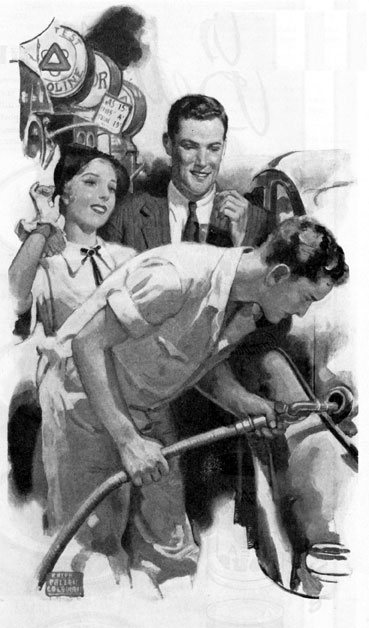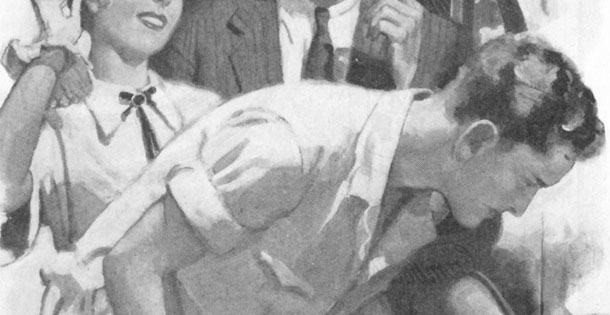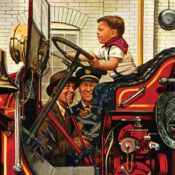In 1930s, humorist J.P. McEvoy wrote the Post column “Father Meets Son” presented to readers in the form of letters filled with advice for navigating life’s rocky road. Employing a mix of wry humor and tough love, Dad doled out life lessons on everything from work to women. Readers loved it.
Dad continues to encourage his son to find the best in his humble job by expounding on the wisdom of Grover Cleveland, how to weed out good advice from malarkey, and why boring people are more interesting than his so-called friends.
Father Meets Son: A Disappointing Job, Part Two
By J.P. McEvoy
Originally published on October 3, 1936

Illustrated by Ralph Pallen Coleman
Dear Son: I am going to save your letter received today. My boy, it’s a honey! When you are older, you will want to read it again. I thought the lamentations of Job and the passionate protests of Jeremiah were something, but you are right up in front, running one, two, three.
As you recite the litany of your sorrows, over and over you ring the old refrain: “What will my friends say? What will people say?” Son, it should cheer you to hear that most of us have suffered from this same silly, but painful, sickness. It is only when we recover — if ever — that we realize the salty truth: The people who matter don’t say anything, and what the people who don’t matter say, doesn’t matter. But old Lao-tse said it better twenty-five hundred years ago: “Those who know, do not speak; those who speak, do not know.”
“I am working in a filling station,” you lament, “and my friends who knew me in college drive up and I have to fill their cars and wash their windshields, and they kid the life out of me. When I go home at night I feel as though I just can’t go back the next morning and face them.”
Well, as Grover Cleveland used to say, we are facing a condition, not a theory. Suppose you just forget how you feel. Check your emotions with your hat and come on in. Let’s face this condition together for a moment.
Who are these friends? Pleasant acquaintances? Most so-called friends are just that. People you met yesterday, like today and will forget tomorrow. Be sure, they likewise will forget you tomorrow. How, then, can they be sincerely interested in what you do? And if they are not sincerely interested, of what earthly value is their opinion one way or the other?
“But I have friends,” you cry, “real friends. Dozens!”
Then you have nothing to worry about. You are rich. In comparison, Rockefeller is sitting on the corner with a tin cup in his hand.
But Youth is optimistic — and a good thing too. When you are young anyone who flatters you is a friend, but as you grow older these “dozens” of friends will thin out. You may have one real friend left — maybe two, rarely three, but seldom more.
Your “dozens” of friends will be up in the stand tossing their hats in the air when you make a touchdown. But if you are thrown for a loss your real friend will be the one to meet you in the shower room as they carry you off the field, and he will stay and help put your nose back in place.
Your “dozens” of friends will be around your neck and in your lap and overflowing the rumble if you have a car to drive them in, but if you are filling the gas tank and washing the windshield, your real friend will be the one who says: “Hi, pal! Aren’t you a lucky stiff to be working? But I know a better spot. I’ll go over there tonight and open it up for you, or break a leg trying.” When you have a friend like that, you can really care what he thinks and says. And as you learn to analyze your other friends in this way, you will be surprised to discover that you really don’t care what most of them think or say, and that they have lost their power to upset you, discourage you or hurt you in any way.
So much for your friends. “What will people say?” is something else again.
This is something that you will have to lick very early, or it will lick you. It isn’t enough to tell yourself that what “they” say doesn’t matter. You’ve got to believe it. And more than believe it, you’ve got to know it. Because it’s true.
First of all, people don’t know anything about you. They really don’t. Second, they don’t even know very much about themselves. So, when they tell you what you should do, ask them how they know. And if they say because they do it themselves, ask them why they do it. That will floor all but the wisest, and they are the only ones you should listen to anyway. If they give you a good reason why they do things, ask them why that reason should apply to you. And then, if they give you a good reason based on shrewd knowledge of you — not snap judgment, not a prejudice, not a conventional attitude — then you can really take what they say under serious consideration, and make up your own mind whether you want to apply it or not. You can learn to listen to everybody — you should — you must — even if they bore you. Remember, there are really no boring talkers. There are only bored listeners.
Listen patiently, critically, even to a bore. Ask yourself: “Why does this man bore me so? How can he possibly be such a bore?” If you are a writer, you may want to write a bore someday, so you should study how a real one is put together. If you are an actor, you may want to play the role of a bore. If this fellow can bore you so completely, learn the trick so you can play the part convincingly. You may want to be a salesman, and from a bore you can learn how not to bore people.
If you start learning to listen, you will find yourself listening to learn. Everybody can tell you something interesting — something old to him, but new to you. When people drive up to your filling station, listen to them when they talk to you. Keep not only your ears open but all your pores. Be a magpie. Gather every shiny scrap of information about anything and everything, and fly home to your nest with it.
But as for what people say, they will say what they have always said. They will say you mustn’t do this and that because it isn’t done. In spite of the fact that it’s being done all the time all around them, and either they can’t see it, or won’t. They will say a young man must make good contacts if he wants to get along in the world, but the truth is, if you get along in the world, you will make good contacts. Remember, if you are the best in anything, you will meet the best in everything.
Lindbergh, flying to Paris with a toothbrush and a sandwich in his pocket, carried letters of introduction to the best contacts. But what put him over was that he got over.
Affectionately,
Dad
Previous: A Disappointing Job, Part One
Next: Meeting Betty
Become a Saturday Evening Post member and enjoy unlimited access. Subscribe now



